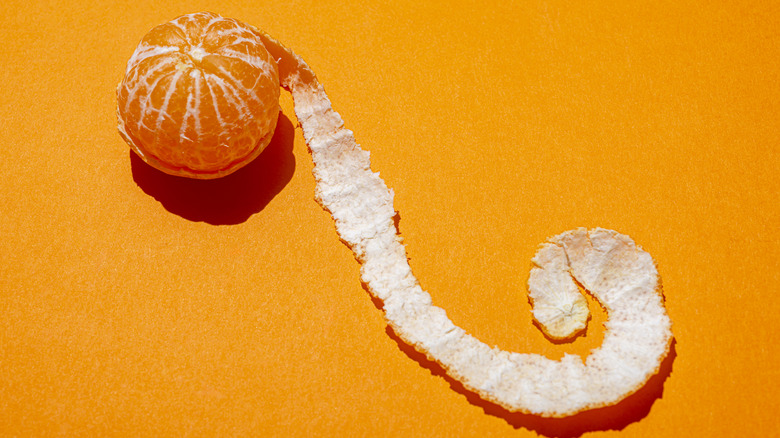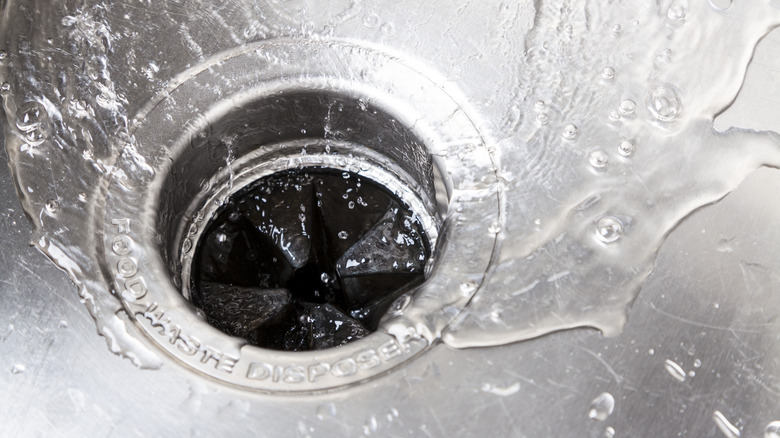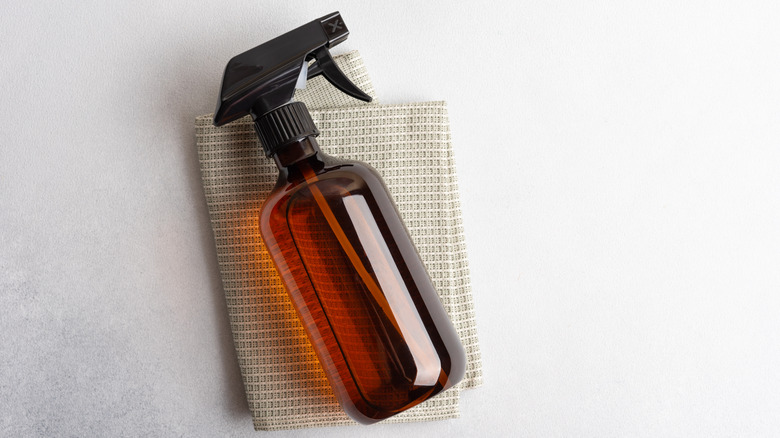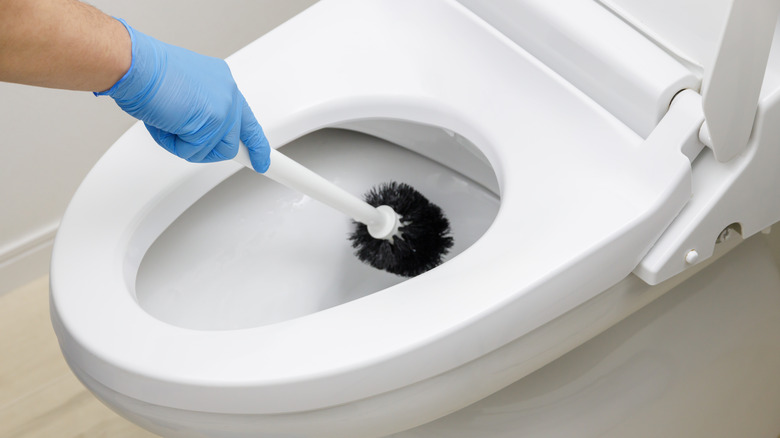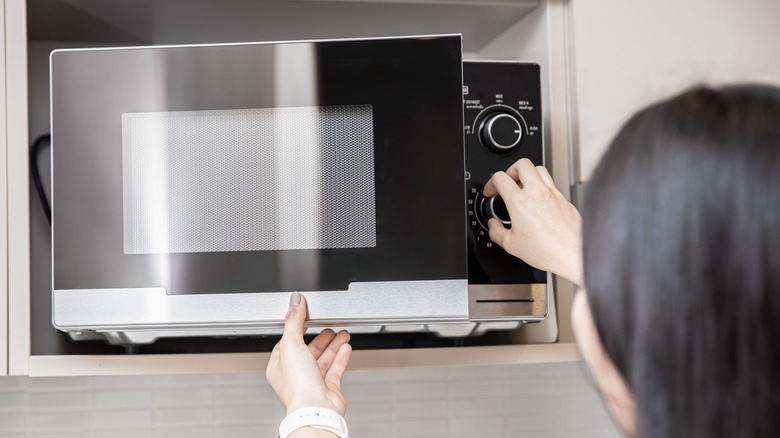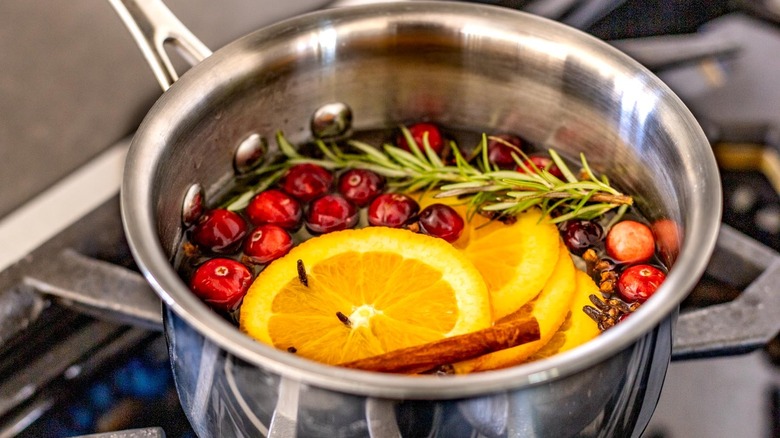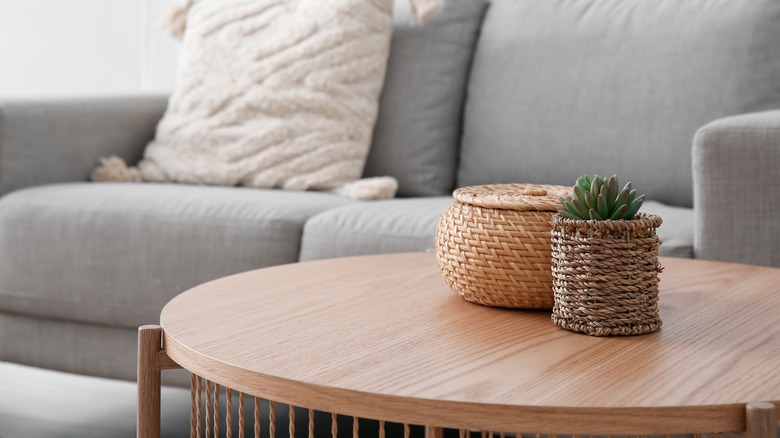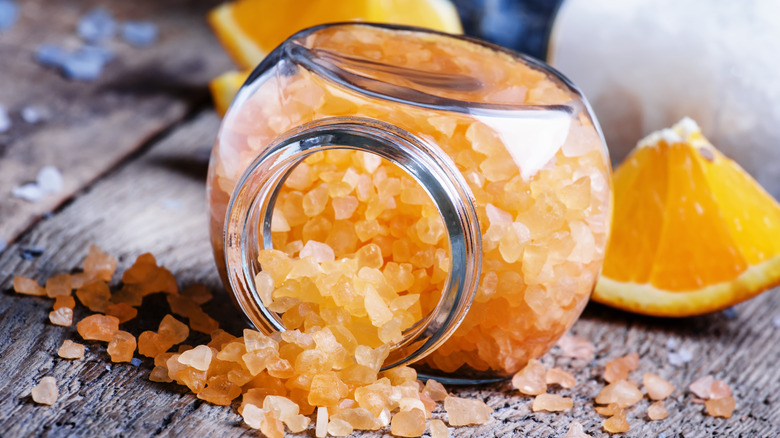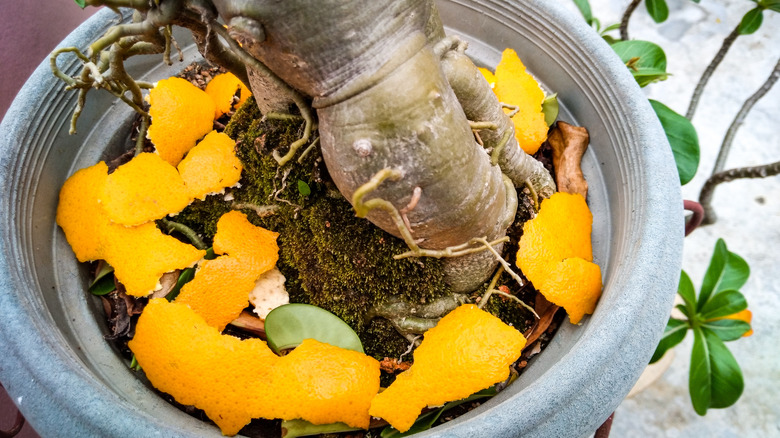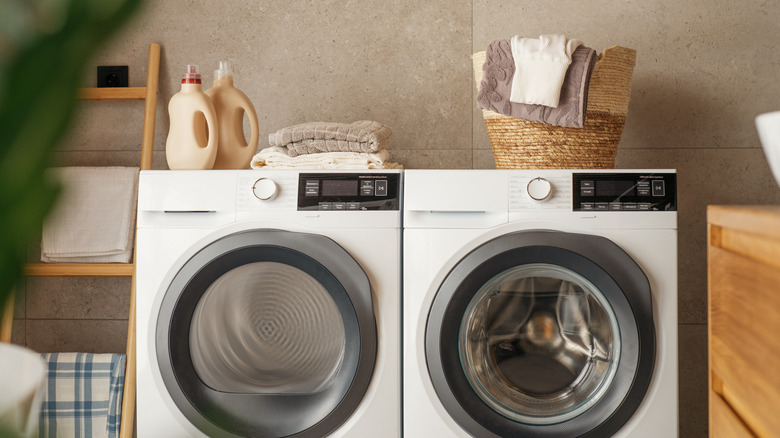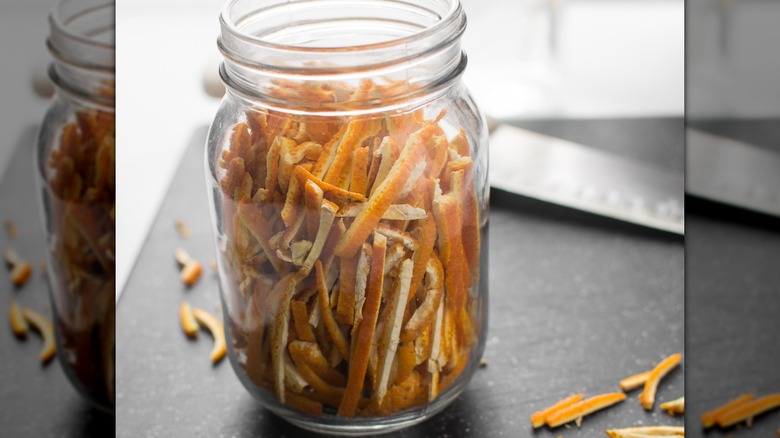7 Genius Orange Peel Cleaning Hacks To Try (& 3 To Avoid)
Using orange peels as a cleaning agent around your home is eco-friendly and tends to smell nice and fresh. However, there are lots of orange peel cleaning hacks out there on the internet and not all of them are created equally. We scoured social media, blogs, and even scientific articles to make sure you know which ones to use and which to skip. For example, you don't want to ruin your wooden furniture by needlessly rubbing orange peels all over it. You also don't want to flush the scraps down your toilet after scrubbing it with peels because it won't really make things smell better. It will just clog up your pipes.
Instead, try these science-backed (with plenty of physical evidence from testers, too) DIY hacks that will clean your garbage disposal and make it smell better, keep pests out of your garden (and all the gross bits that bugs can bring along with them away, too), plus keep your linens fresh. All without having to bring harsh chemicals into your home or waste perfectly good leftover orange peels. These are the best seven genius orange peel cleaning hacks to try (and three to avoid at all costs!).
Do: Try orange peels as garbage disposal freshener
This DIY freshener is an easy task to perform. You can do it every time you eat an orange, or save the peels up in a jar for when the disposal smells especially bad. Simply place the rinds in the disposal and run some water over the top of them while turning it on. The peels will then be pulverized, releasing a sweet scent into the air and masking any musk from the appliance.
While there haven't been scientific studies to show that orange peels alone make your garbage disposal any cleaner, such as killing germs or bacteria, the citrus sure does make it smell better — and anecdotally the hack has seen great success. However, another great way to perform this hack is to soak the orange peels in white vinegar before putting them down the drain. This is a good step to include if you want to add a little bit more power to your clean, as the science backs up that vinegar can kill germs. By infusing the orange peels with it, you are coating the disposal's blades in a natural disinfectant.
Do: Make an all-natural all-purpose cleaner
Studies show that vinegar is a great alternative to chemical disinfectant, as it can kill harmful bacteria like E.Coli, make food safer to eat after being rinsed with it, and make stinky places smell a lot better. If you are trying to run a more eco-friendly kitchen by reducing plastic waste or using fewer chemicals, vinegar is a fantastic option. However, there is just one issue that you might run into: The smell of vinegar. Plenty of folks don't like the strong, acidic smell of the liquid. So, a great way to cut through the scent without taking away from its cleaning properties is to add orange peels to the mix.
The first thing to do is to collect orange peels as you eat the fruit, and let them sit in a closed glass jar. If the peels dry out, that's OK. It won't make them any less effective. Once the jar is full with orange rinds, fill it to the top with distilled white vinegar. Let the peels soak in the jar for two weeks. Once finished, pour the liquid through a strainer into a spray bottle. This way, all of the large chunks of peel are taken out. You can dilute the mixture with tap water to fill up any extra space in the bottle. With that, you are all set to use this orange peel hack to clean grease in your kitchen, including the cabinets, counters, sink, and stovetop.
Don't: Use peels as a toilet bowl cleaner
You might have seen a cleaning hack floating around on the internet encouraging you to use orange peels to clean your toilet bowl. The idea behind the hack is that the peel can function as a stand in sponge. You can use the peels to polish away any grime, with the fresh orange oil it leaves behind disinfecting the toilet and making it smell better. Unfortunately, orange peels don't provide enough abrasive action or sanitizing power to effectively clean a toilet bowl. Instead, they are likely to crumble if you use too much pressure when cleaning. And if these bits fall off into the toilet, they might also clog the plumbing if flushed. It won't be fun to fish them out. Oranges also can't disinfect anything on their own; they need to be paired with alcohol or vinegar to do that.
Instead, when cleaning your toilet, it's best to stick to more tried and true methods. If you like the idea (and the scent of orange), try using the natural all purpose cleaner we taught you how to make in the second slide. When paired with a sturdy scrub brush, you will have better luck.
Do: Use orange peels and water as a microwave cleaner
Microwaves can be hard to clean. If your bowl of chili splashes out or your oatmeal bubbles over, you should wipe it off right away while it's still wet or you risk cooking it on more and more with each new cycle. Once food dries, it takes a lot more effort to get it off. Luckily, there is a great orange peel cleaning hack that makes getting the baked-on food off a lot easier. First, grab a large microwave safe bowl. Fill it most of the way up with water, then place the orange rinds of at least one orange (but the more the merrier!) inside, too. Finally, microwave the bowl for at least five minutes.
While the bowl is "cooking," so to speak, the water will heat up and turn to steam. As the steam comes into contact with the grime in your microwave, it will begin to loosen up. At the end of the cycle, you should be able to wipe or pick off any food left behind with little to no elbow grease required due to this. The orange peels also release a pleasant scent in the process — making your once musty microwave smell good as new.
Do: Use the peels to freshen the air in your home
If the air in your home smells stale or even straight up stinky, one of the best ways to give everything a refresh is to put on a simmer pot. These pots can go for hours and freshen the air in your home, replacing boring, foul scents with warm, earthy alternatives. While there are many different simmer pot recipes, orange peels tend to show up a lot due to the fresh, zesty smell they give off.
To make a simmer pot, fill a medium sized pot about ¾ of the way with water. Put the stove on a low heat — this part is very important for safety's sake. You don't want to cook anything, just let it release a nice smell. Next, fill the pot the rest of the way with your favorite natural scents. Orange peels, of course, but they pair well with cloves, cinnamon, and even other citrus rinds like lemon, lime, and grapefruit. As the water heats up, the smell will grow stronger, giving your home a clean, fresh scent without any aerosol sprays or even candles. Just remember to turn your simmer pot off if you will be leaving your home. You should also check in on it at least every 30 minutes to see if it needs more water, as letting it run dry can be a safety hazard.
Don't: Rub peels directly on wood
Orange-scented cleansers or cleaners with orange oil inside tend to work great polishing wood. It adds a layer on top of the wood, so dust can't stick as easily. You will often see them on the shelves of hardware stores so you might be tempted to "cut out the middleman," so to speak, and just use orange peels or fresh orange juice at home. Unfortunately, the actual peels' acidic nature can cause damage. It is not easy to make orange oil at home. The best you can do is to create an orange-infused vinegar cleanser, as mentioned. However, vinegar is harmful to wood. It will strip the sealant off wood that has it and cause warping when it seeps into unsealed wood.
Instead, the best thing to do is to keep up with regular dusting. Wipe your wooden furniture off with a clean rag at least once a week. To prevent any damage from the sun like bleaching, keep it out of the bright direct rays, as well. Finally, if you would like to use a varnish, choose one with low VOCs (volatile organic compounds) — which are chemicals that can cause health problems. Avoid using orange peels because they won't help, just cause damage.
Do: Create a deodorizer with epsom salt
If you want your house to keep smelling fresh, whether or not the stove is on, a great alternative to a simmer pot is a DIY-deodorizer with epsom salt and orange peels. There are two ways to do this. The first is to save an entire half of an orange peel, so that it's shaped like a small cup. Fill the peel to the brim with epsom salt. You can add other fresh-smelling things like snips of herbs from your garden, or essential oils for an extra kick. The second way to execute this hack is by combining fresh orange peels with the salt in a small jar or bowl with no lid.
While the success of these all natural deodorizers having a significant impact on the house is anecdotal, epsom salt is great at absorbing moisture. The idea is that the salt will pull moisture from the orange rinds, taking on and amplifying their scent. You will need to change the dried up orange each week with a fresher one, to keep the scent strong enough to be worth it.
Do: Sprinkle orange peels in your garden to deter pests
You can use orange peels to keep pests out of your plants. There are two ways to use the fruit for the best results. The first method is to chop the orange peels into tiny pieces. You can also grind them up into a powder. Next, take the pieces and sprinkle them in the soil of the plants you want to keep pest free. You will have to do this at least weekly because the oranges only really keep their repelling power when they are fresh. When they dry, the bugs can't smell them anymore so they won't stay away. However, they add nutrients to your garden as they decompose. The other method is to boil orange peels to extract their scent. Then spray the orange-infused water onto the soil. The more orange peels used in this method, the stronger your spray will be, so it is more likely to work.
Bugs like mosquitoes, flies, and ants come with lots of sanitary issues, from their dirty feet to the fecal matter they leave behind, plus the diseases they can spread — so keeping pests out of your house is essential to keeping it clean. They don't like orange peels because of a chemical called limonene. It is a "natural chemical that is toxic to insects yet harmless to plants and animals, making it an effective insect repellent," David Moore, board-certified entomologist, told Homes & Gardens.
Don't: Use peels as clothing stain remover
Some sites might recommend using orange peels to get stains out of your clothing. The idea is to toss a handful of orange peels, loose, into the barrel of your washing machine. Allegedly, the oils from the peels will make your laundry look brighter, smell better, and help your detergent do its job a little bit better. Yet in general, washing your clothes with food scraps is not a great idea. Citrus oils can stain clothes further or cause discoloration, especially on delicate or light-colored fabrics.
If you would like your clothing to have a fresh orange scent, there is a better way to go about it. After your clothes have been washed, add a few drops of orange essential oil to an unscented dryer sheet. Toss the sheet in with your load for a fresh, citrus zest. If you prefer not to use dryer sheets at all, you can make dryer balls out of wool and scent them with orange oil, instead. It's the same outcome: fresh smelling laundry, without turning your washing machine into a compost bin.
Do: Add alcohol to the oranges to create a linen spray
Peel at least two oranges, but having the peels from four or more is best. Next, add the peels to a jar with a tight lid and pour in roughly 4 cups of rubbing alcohol. More if all the peels aren't totally covered by the liquid. Place the jar in a cabinet (out of the sun and cooler in temperature) for at least two weeks. Once it's done soaking, strain the peels out of the alcohol. Finally, combine filtered water with the alcohol in a 50/50 ratio in a spray bottle. If you don't think it smells strongly enough, you can add a few drops of orange essential oil as well.
This mixture can be spritzed to lift smells from fabrics and get rid of germs — much like DIY Febreeze. You can clean bad smells off your couch, curtains, and even desk chair. Since you can't really throw these things into the washing machine, this concoction makes things much easier. It works because the alcohol is a disinfectant while the oranges give it a fresh, clean scent.
